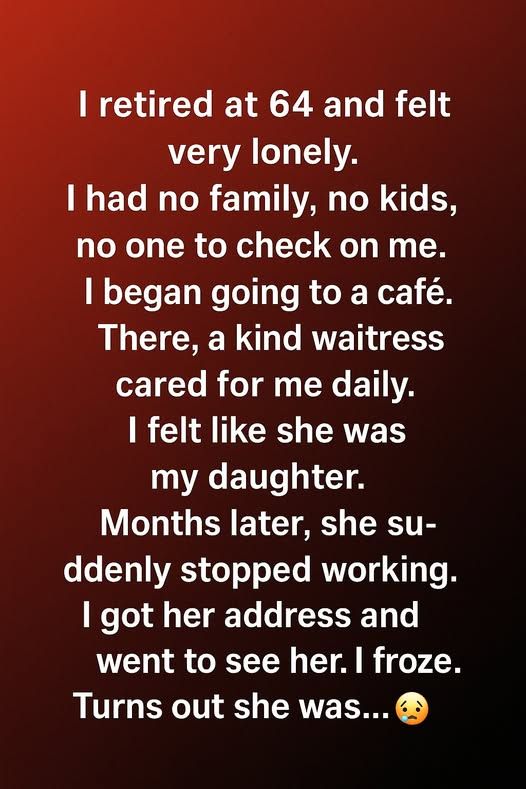When I retired at the age of sixty-four, the days that followed felt almost painfully quiet, stretching endlessly with a stillness that was almost deafening. My house, once filled with the echoes of busier days, now held only the faint hum of the refrigerator and the occasional creak of the floorboards. I had no spouse to share a morning coffee with, no children to call or drop by unexpectedly, and no neighbors who checked in. The silence wasn’t just quiet; it was a tangible presence, a weight pressing against my chest with every passing hour.
Out of habit, more than hunger or need, I began to visit a small café near my neighborhood each morning. It became my routine, a fragile anchor to a world outside my walls. The café was modest—walls painted in soft cream, wooden tables polished by years of use, and the faint aroma of freshly brewed coffee that lingered in the air like a comforting memory.
Every morning, the same young waitress greeted me with a warm, radiant smile, her eyes sparkling as if they held a little secret of happiness meant just for her patrons. She moved with a graceful familiarity, setting down cups and pastries with quiet precision, and somehow, without fail, her presence made the café feel less like a public space and more like a little home I had stumbled upon.
She always remembered my usual order—black coffee with a single sugar and a small croissant—and she never failed to ask how I was doing, her voice carrying genuine curiosity and care. Her kindness was simple, but it had a depth I hadn’t realized I was craving. Over time, our brief exchanges grew into longer conversations. I told her about my younger days, about places I had traveled, about dreams I had once had and hobbies I had abandoned. She listened patiently, nodding, laughing gently at my stories, sometimes asking questions that made me feel seen, really seen, in a way that no one else had for years.
Encouraged by her, I began exploring little hobbies again—reading books I had shelved for decades, taking long walks through the park, even trying my hand at watercolor painting. But more than these activities, it was the human connection that I had been missing. I began to look forward to our daily conversations more than the coffee itself, more than the routine of stepping out of my silent house. Somewhere along the way, I realized I had begun to feel a protective, almost fatherly bond toward her.
It was a feeling I never voiced, but in my heart, she felt like the daughter I had never had. Her laughter lit a small corner of my world that had been dim for decades, and her presence reminded me that life could still hold tender, meaningful moments, even in its quieter years.
Then, one morning, she wasn’t there. The next day, still gone. And as the days passed, the small emptiness that had been absent from my routine returned, heavier this time. I found myself glancing at the café doors, hoping, expecting, that she would appear. When a week passed without seeing her, I could no longer ignore the gnawing worry that had taken root.
I approached the manager, a kind man who had watched our small friendship blossom, and asked cautiously if he knew why she hadn’t been coming in. He explained that she had taken a leave of absence for personal reasons. The words offered some clarity, but not much comfort. The worry in my chest grew heavier, each beat a reminder of how deeply I had come to care for her.
With hesitation battling concern, I asked him quietly if I could leave a note for her. After a brief pause, he nodded and, understanding the sincerity in my eyes, quietly gave me her address. I held the paper tightly in my hand, feeling a mix of nervousness and anticipation, and made my way to her home, unsure of what I would find.
When I arrived, she was sitting outside, a small chair tucked near a blooming garden. She looked tired, her shoulders slumped and her eyes carrying the weight of exhaustion, but there was a quiet peace about her, a soft calm that spoke of resilience and love given in secret. When she saw me, she offered a small, tentative smile.
She shared gently that she had been caring for her sick mother, who had been unwell for months. The emotional toll had left her drained, and she admitted that stepping away from the café had been a necessity for her well-being. I listened, offering words of support, not out of obligation, but from genuine care, my voice soft and reassuring.
And then, with tears glistening in her eyes, she whispered something that pierced straight to the core of my heart: “I always wished I had a dad who cared like you do.”
In that moment, the invisible walls we had each built around ourselves crumbled. We both found, in each other, the family we had been missing all along. For her, a fatherly presence she had never known, and for me, a daughter I had never been given—but now, in this quiet exchange, we were family. The years of loneliness and longing seemed to fade, replaced with a profound sense of connection and belonging that neither time nor distance could erase.
From that day on, our bond grew stronger, nourished by shared moments, laughter, and the knowledge that sometimes, family isn’t defined by blood, but by the love and care we choose to give and receive. The café remained our meeting place, but now it was more than a routine—it was a sanctuary, a place where two souls had found each other, healed in small, beautiful ways that would last a lifetime.
